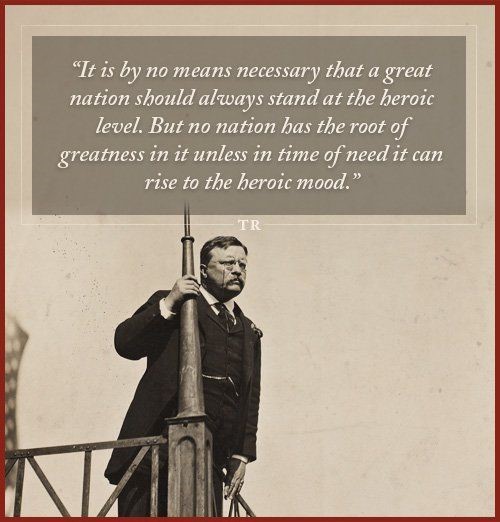
“We have no room in any healthy American community for a German-American vote or an Irish-American vote, and it is contemptible demagogy to put plans into any party platform with the purpose of catching such a vote. We have no room for any people who do not act and vote simply as Americans, and nothing else. Moreover, we have as little use for people who carry religious prejudices into our politics as for those who carry prejudices of caste or nationality.”
Theodore Roosevelt, “True Americanism”, The Forum Magazine, April 1894
This is the fifth article in my series “The Crisis of the American Spirit”. Please click on the “Politics – Nationalist Theory” tab in menu above to read the previous four, filed in reverse chronological order.
When President Bill Clinton declared “The era of big government is over”, he threw the modern-day Democratic Party into one of the greatest ideological crises in it’s history. Thanks to Franklin Roosevelt and Lyndon Johnson, it had abandoned the Jefferson-Jackson philosophy of states rights and small government in favor of Theodore Roosevelt’s call for a strong national government dedicated to effective regulation. Now, one of its own said it had to find a new ideological anchor. It found it a new form of political division that rejected Theodore Roosevelt’s call to unity above and, instead, echoed its old platform – identity politics.
The need to reconcile American diversity was recognized early in our nation’s history. The first major identity groups were sectional or state based. People identified as New Yorkers or Virginians and the Constitution was crafted to recognize the validity of those identities and preserve them while trying to build a cohesive national government at the same time. The inevitable tension between these two goals led to sectional based political clashes between West and East and eventually North and South. Back then, the Democratic Party championed state’s rights against those who favored a strong federal government. Their approach dominated American public policy for most of the first 70 years of our history.
Meanwhile, the seeds of our current identity group politics were being sown by our failure to address the stain of black slavery. Attempts to reconcile the moral contradiction of slavery within the state’s rights framework failed miserably. Even the Southern slave states eventually rejected this approach and imposed their own version of a national solution for slavery in the form of the Fugitive Slave Act of 1850. The backlash against it led to the founding of the Republicans, which became the new party advocating a strong national government. The victory of the North in the bloody Civil War that followed enshrined the dominance of the national government. People no longer said “The United States are”. They said “ The United States is”.
Despite it’s new power, the national government was unable to prevent the re-subjugation of black Americans, mainly because it remained a federalist system dependent on at least state acquiescence to national policies. The 1960’s civil rights movement offered a glimmer of hope for real racial socioeconomic integration. However, as I mentioned earlier in this series, the blue collar jobs that enabled the early immigrants to achieve the American Dream moved overseas and the education system was allowed to deteriorate, thus making it difficult to for blacks to compete in the new economy.
Black Americans’ isolation eventually forced them into a form of nationalism, which became their main source of identity. Meanwhile, the 1960s and 1970s saw the rise of the women’s liberation, gay rights and disability rights movements. They also emphasized the importance of group identity and solidarity, each believing they were special victims suffering unique discrimination and oppression despite laws designed to prevent discrimination and integrate them into broader American society. Instead, these groups focused on their different American histories and pinned their primary loyalty to their particular group rather than their country, which they believed was an enemy.
Sadly, instead of challenging this mindset, the Republican Party of Donald Trump doubled down on it by fostering a new identity group. The MAGA ideology claims to preserve America, but in fact teaches its adherents to think of themselves as victims and members of a white Christian subgroup who are under attack by other groups. This kind of victimhood is fundamentally unAmerican whether it occurs on the left or right and Theodore Roosevelt would have condemned it as such.
Nevertheless, our current political class stokes these identity group divisions for their own political benefit. They do so by engaging in rhetoric that inflames a group’s grievances and feelings of victimhood without developing a sustainable solution. They then try to assemble winning coalitions by piling up monolithic voting groups like building blocks. This cynical strategy conveniently masks the fact that many of those group’s grievances stem from the same elitist exploitation and that, in the end, each group has more in common than they think.
A bridge leader like TR would have recognized the danger this kind of politics posed to American strength. He would have reminded Americans of Lincoln’s maxim that “A house divided against itself cannot stand” and urged all groups toward tolerance of their differences. He would have called all Americans to unify to address inequalities, while reminding blacks, gay and other minorities that their progress to this point came because they were Americans and benefited from our shared beliefs in justice and equality.
Thankfully, voters have started to wise up to this cynical manipulation. The overwhelming support Democrats enjoyed among blacks and working-class voters has suffered significant inroads from Republicans while higher income voters are increasingly Democratic. Despite the best efforts of the political class, Americans are starting to think for themselves and explore new, less divisive and more relevant political groupings.
Usually, such breakdowns of historic voting blocs herald a major realignment of American politics toward a more relevant ideological debate. If this new politics is to succeed, it must challenge the forces that have weakened the American community spirit and unify us to face the realistic limits of today’s multipolar world. It starts with presenting the American people with clear and relevant choices, hopefully through a bridge leader like TR. My next series of articles will set forth why these new choices will be between the ideologies of globalism and American nationalism.


